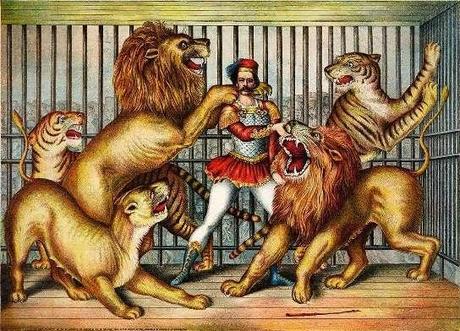 photo source : wikipedia
In the impugned
case – a workman was employed by a lion tamer to look
after baggage, clean out cages, and generally make himself useful, but it was
no part of his duty to feed the lions. One afternoon the workman was left in
sole charge of the cages of lions, with
orders to see that no harm came to them or anyone else by reason of their
fierceness. One of the lions got out of the cage and into a dressing room, but
there was no evidence to show how this happened. The workman went into the
dressing room and tried to drive the lion back into the cage, when the lion
turned on him and killed him.
In a claim by the workman's
dependants against the employer under the Workmen's Compensation Act, 1906, the
county court judge dismissed the claim, being of opinion that the facts were
consistent only with the deceased having interfered with the lion for some
purpose of his own, there being no evidence to support the theory that the
lions had fought or that the deceased had acted otherwise on an emergency.
However, in the appeal, it was held
that as the deceased had been left in charge, it was his duty to try to get the
lion back into the cage, and that as he was killed in the discharge of that
duty the accident arose " out of and in the course of his
employment."
Strange
are the ways of people and this case is interesting to say the least
With regards – S.
Sampathkumar
photo source : wikipedia
In the impugned
case – a workman was employed by a lion tamer to look
after baggage, clean out cages, and generally make himself useful, but it was
no part of his duty to feed the lions. One afternoon the workman was left in
sole charge of the cages of lions, with
orders to see that no harm came to them or anyone else by reason of their
fierceness. One of the lions got out of the cage and into a dressing room, but
there was no evidence to show how this happened. The workman went into the
dressing room and tried to drive the lion back into the cage, when the lion
turned on him and killed him.
In a claim by the workman's
dependants against the employer under the Workmen's Compensation Act, 1906, the
county court judge dismissed the claim, being of opinion that the facts were
consistent only with the deceased having interfered with the lion for some
purpose of his own, there being no evidence to support the theory that the
lions had fought or that the deceased had acted otherwise on an emergency.
However, in the appeal, it was held
that as the deceased had been left in charge, it was his duty to try to get the
lion back into the cage, and that as he was killed in the discharge of that
duty the accident arose " out of and in the course of his
employment."
Strange
are the ways of people and this case is interesting to say the least
With regards – S.
Sampathkumar
17th Nov. 2014.

